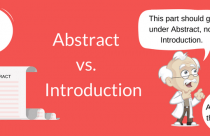How To Write An Effective Research Abstract

What is an Abstract?
When you have written a research paper, a thesis, or a dissertation, it is common practice to provide a summary of the work contained in the document. Research supervisors will often recommend that you wait until you have finished the document before writing the abstract to ensure that it accurately represents what the work contains. This is good advice, because the abstract isn’t written for you to remind yourself of what you have done. It is written for a specific purpose and for specific audiences. An abstract is a self-contained, short, and powerful statement that covers the main points of a piece of writing.
What is the Purpose of an Abstract?
Since academic research documents can run from 2000-word journal articles up to dissertations of tens of thousands of words, it is helpful to provide a brief summary of what the work contains, to avoid the frustration of reading the document in full only to realize that it doesn’t meet your needs as a fellow researcher. By reading the abstract at the beginning, assuming it is well written, you are given enough information to decide whether or not to invest time in reading the work in full. Broadly, the two main reasons for writing an abstract are:
- Selection – to help readers decide if they want to read your article
- Indexing – for quick recovery and cross-referencing.
The Audiences for an Abstract
Database searches, even targeted ones, can produce hundreds of results. Research students then face the ominous task of slogging through that list to identify articles and papers that are relevant to their specific research topic. Abstracts make that process more manageable by succinctly summarizing the paper so that the researcher can make a decision in minutes rather than hours.
Since abstracts are sorted and categorized into indexes to facilitate searching in larger academic databases, librarians are greatly appreciative of well-written abstracts. Correct use of search keywords is important here but of greater value is an accurate reflection of what your article or paper is about.
If you choose to submit your research to a local or national conference, your abstract will be requested as part of your application packet.
Key Components of an Effective Abstract
-
- Concise: It’s a concise description of your research: 150-200 words
- Tense Usage: Since you’re describing completed work, it should be written in the past tense
- Choose the Right Voice: Since you’re describing the work you performed, it should be written in an active rather than passive voice
- Structure: Follow a formal structure to make sure that all relevant information is included:
- Problem Statement: Why the research topic is important and why you chose to investigate it
- Methodology: How you went about investigating it
- Results: What you learned
- Conclusion: The implications of what you found
- Avoid Jargons: Assume no previous knowledge on the part of your reader – avoid acronyms and explain any topic specific terminology
- Summarize your Research: Leave any judgments as to the relevance of the research to your reader. This is a summary document, not a critique and should be written as such
- Keep in Context: Stay within the confines of your document – don’t include any information that can’t be found in the research paper/article
- Keywords: Use relevant keywords to facilitate correct classification in appropriate indexes
- When Should You Write One? Write the abstract as soon as you have finished your research, while the information is still fresh in your mind
Types & Examples of Abstracts
Descriptive Abstract: Usually a short summary of a 100 words or less without any conclusions
“It is an important and difficult job to write an eye catching abstract. A large percentage of the manuscripts that are submitted to academic journals are rejected because their abstracts are poorly written. This paper provides a new and step by step approach for writing a good structured abstract.”
Informative Abstract: Also called as a structured abstract
“Research reported by Daly, Miller, and their colleagues suggests that writing apprehension is related to a number of factors we do not yet fully understand. This study suggests that included among those factors should be the belief that writing ability is a gift. Giftedness, as it is referred to in the study, is roughly equivalent to the Romantic notion of original genius. Results from a survey of 247 postsecondary students enrolled in introductory writing courses at two institutions indicate that higher levels of belief in giftedness are correlated with higher levels of writing apprehension, lower self-assessments of writing ability, lower levels of confidence in achieving proficiency in certain writing activities and genres, and lower self-assessments of prior experience with writing instructors. Significant differences in levels of belief in giftedness were also found among students who differed in their perceptions of the most important purpose for writing, with students who identified “to express your own feelings about something” as the most important purpose for writing having the highest mean level of belief in giftedness. Although the validity of the notion that writing ability is a special gift is not directly addressed, the results suggest that belief in giftedness may have deleterious effects on student writers.”
Since your abstract will be the key to finding the complete work, take the extra time to double check it before submission. Better still, have someone who knows nothing about your research take a look at it – that way you can be sure you have hit the appropriate level of assuming no previous knowledge.









